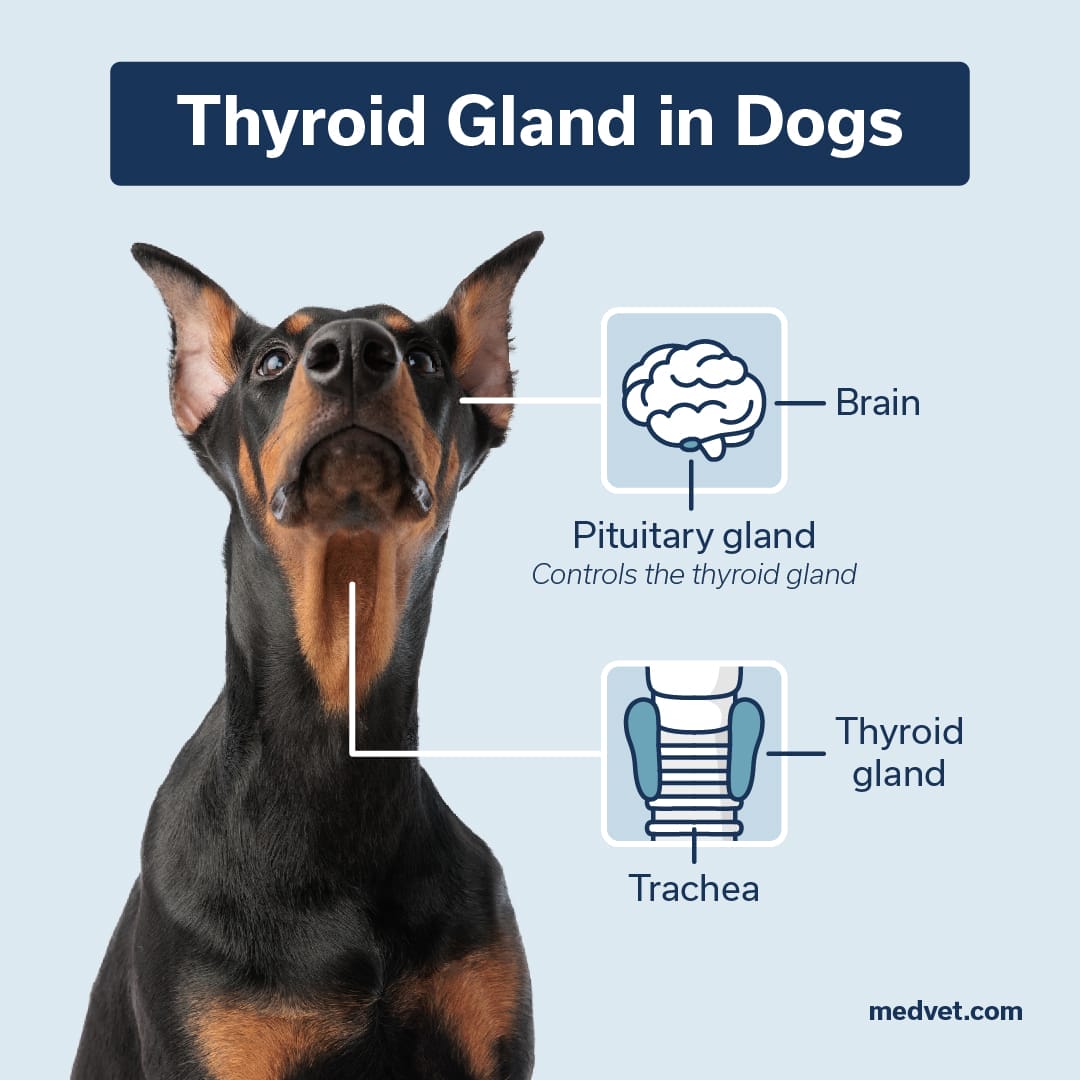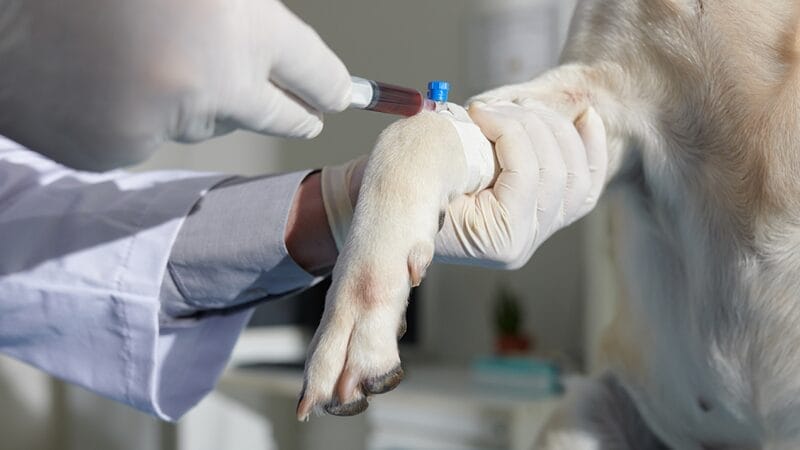Thyroid Disease in Dogs: Causes, Signs, and Treatments
Thyroid disorders are common in dogs and impact metabolism and growth. Learn more, including signs and treatment.
The thyroid gland is one of the most important glands in the body, playing a major role in metabolism, growth, and development of the body. In dogs, thyroid disorders are a common health issue. Understanding how the thyroid functions, recognizing the signs of a potential thyroid disorder in your dog, how a thyroid disorder is diagnosed, and knowing the treatment options can help you manage your dog’s health better.
What is the Thyroid?
The thyroid gland, located in the neck near the trachea, or windpipe, has two lobes, one on each side of the trachea. It is controlled by the pituitary gland, which is located at the base of the brain. The thyroid steadily releases hormones into the bloodstream, acting like the body’s “furnace” and regulating many bodily functions, including metabolism, or how active your cells are utilizing energy. The thyroid produces primarily thyroxine (T4) and triiodothyronine (T3).
Your dog’s thyroid gland can become diseased, which can cause their “furnace” to act up. In dogs, one of the most common thyroid disorders is hypothyroidism. Hypothyroidism occurs when the thyroid gland does not produce enough thyroid hormone, leading to a slowdown in the dog’s metabolism. Thyroid disorders can develop in your dog without you even realizing it and by the time it is diagnosed, your dog could have lost up to 75% of their thyroid tissue.

Signs of Canine Hypothyroidism
The signs of hypothyroidism in dogs can be diverse and sometimes subtle, making it a challenging condition to diagnose based solely on clinical symptoms. Common signs include:
- Weight Gain: Dogs may gain weight despite no increase in appetite or caloric intake.
- Lethargy: Affected dogs often show a marked decrease in activity levels; they may seem unusually tired or sluggish.
- Skin and Coat Problems: Hypothyroid dogs often have skin issues such as dryness, flakiness, and skin darkening or infections. Additionally, they may have poor-quality hair coat, with hair loss, often around the flanks, thighs, neck, and tail. They may also have slow hair regrowth or hair that won’t regrow after it has been clipped.
- Cold Intolerance: Dogs with hypothyroidism may seek out warm places and have difficulty tolerating colder temperatures.
- Reproductive Issues: Females may have irregular heat cycles, and males may show a lack of libido.
- Other Signs: Other less common signs can include anemia (low red blood cells), high blood cholesterol, neurological signs, and slow heart rate.
Causes of Canine Hypothyroidism
There is not always a clear cause of canine hypothyroidism. It can be lymphocytic thyroiditis, an autoimmune disorder, involving your dog’s immune system attacking the thyroid gland. Over time, this autoimmune attack can destroy enough thyroid tissue to cause hypothyroidism.
Idiopathic thyroid gland atrophy, on the other hand, involves the degeneration and replacement of the thyroid tissue with fat, although the underlying cause of this process is not well understood.
Hypothyroidism is more frequently observed in medium to large breed dogs and usually affects middle-aged dogs between the ages of four to 10 years old. While any dog can have the condition, breeds that are more predisposed to hypothyroidism include Beagle, Borzoi, Boxer, Cocker Spaniel, Doberman Pinscher, Giant Schnauzer, Golden Retrievers, Irish Setters, Rhodesian Ridgeback, among others.
Diagnosis of Canine Hypothyroidism
Diagnosing hypothyroidism typically involves a combination of clinical evaluation and diagnostic testing. Your veterinarian will start with a thorough history and physical examination. Blood tests are necessary to check your dog’s hormone levels. The most common tests include:
- Total T4 (TT4): This is a primary screening test for hypothyroidism but can be influenced by other factors such as illness and medications.
- Free T4 (FT4) by Equilibrium Dialysis: This test measures the unbound T4 levels and is less affected by non-thyroidal illness.
- Thyroid-Stimulating Hormone (TSH) Assay: This test measures the level of TSH. In hypothyroidism, TSH levels are typically elevated as the pituitary gland tries to stimulate the thyroid gland to produce more hormones.
- T3 and T4 Autoantibody Tests: These tests help identify autoimmune thyroiditis by checking for antibodies against thyroid hormones.
A T4 level is included on many routine blood panels, making it relatively easy for your veterinarian to note that your dog’s thyroid level is low. However, because your dog’s T4 level can be influenced by illness and medications, additional tests are often needed to confirm the hypothyroidism diagnosis.
Treatment of Canine Hypothyroidism
Treatment for hypothyroidism in dogs generally involves hormone replacement therapy. The most common medication used is FDA-approved levothyroxine, a synthetic form of thyroxine that is given orally. The dosage and frequency of administration depend on the severity of the disease and the individual dog’s response to therapy. Treatment is usually lifelong and requires regular monitoring, including periodic blood tests to ensure adequate hormone levels are maintained.

Prognosis for Dogs with Hypothyroidism
The prognosis for dogs diagnosed with hypothyroidism is generally very good. With appropriate treatment, most dogs see a significant improvement in their symptoms and can lead a normal life. Regular follow-up visits with your veterinarian are important to adjust medication dosage and monitor your dog’s overall health.
While hypothyroidism is not curable, it is very treatable. Early recognition and treatment are key to managing this condition effectively, helping to ensure that affected dogs maintain a good quality of life.
If you suspect your dog might have hypothyroidism, it is important to see your family veterinarian for an evaluation. Your veterinarian may recommend your dog see a veterinary specialist in internal medicine for a more thorough assessment and to discuss the best ways to manage their health.
Visit our Pet Care Resources library for more pet health and safety information.
FAQs
Learn More
Veterinary internal medicine specialists are trained to treat your pet’s complicated internal systems, including gastrointestinal tract, kidneys, central nervous system, and endocrine system.
Veterinary Internal MedicineContents
Learn More
Veterinary internal medicine specialists are trained to treat your pet’s complicated internal systems, including gastrointestinal tract, kidneys, central nervous system, and endocrine system.
Veterinary Internal Medicine


